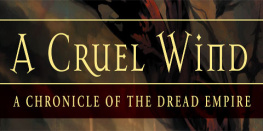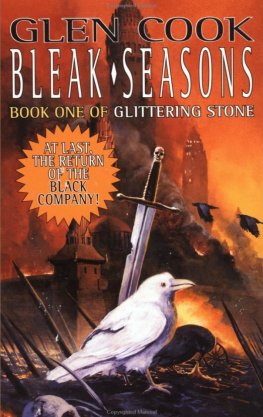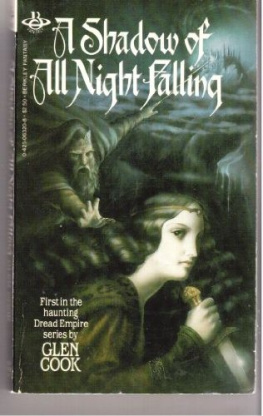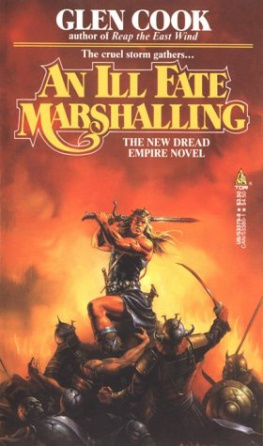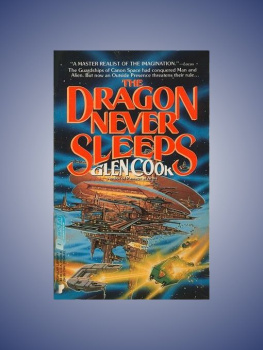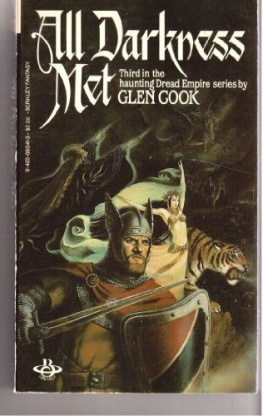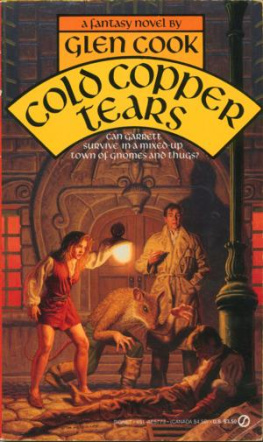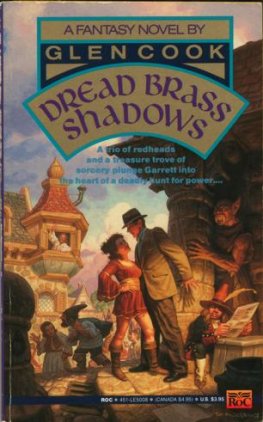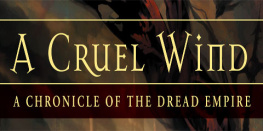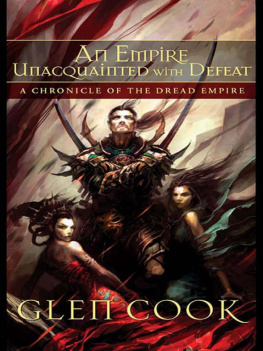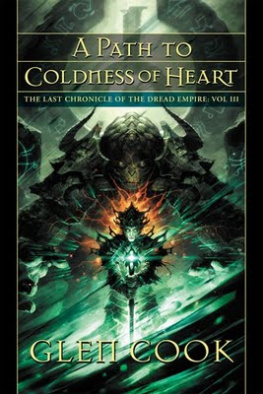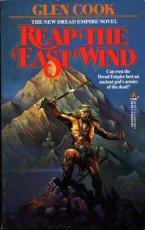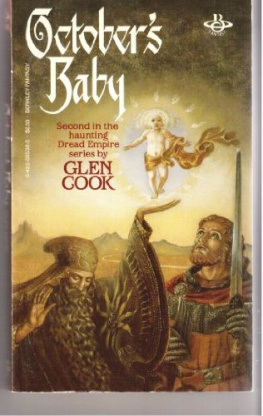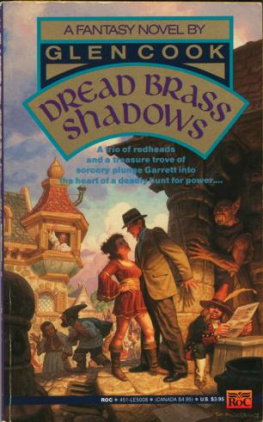Glen Cook - A Cruel Wind: A Chronicle of the Dread Empire
Here you can read online Glen Cook - A Cruel Wind: A Chronicle of the Dread Empire full text of the book (entire story) in english for free. Download pdf and epub, get meaning, cover and reviews about this ebook. year: 2006, publisher: Night Shade Books, genre: Art. Description of the work, (preface) as well as reviews are available. Best literature library LitArk.com created for fans of good reading and offers a wide selection of genres:
Romance novel
Science fiction
Adventure
Detective
Science
History
Home and family
Prose
Art
Politics
Computer
Non-fiction
Religion
Business
Children
Humor
Choose a favorite category and find really read worthwhile books. Enjoy immersion in the world of imagination, feel the emotions of the characters or learn something new for yourself, make an fascinating discovery.
A Cruel Wind: A Chronicle of the Dread Empire: summary, description and annotation
We offer to read an annotation, description, summary or preface (depends on what the author of the book "A Cruel Wind: A Chronicle of the Dread Empire" wrote himself). If you haven't found the necessary information about the book — write in the comments, we will try to find it.
A Cruel Wind: A Chronicle of the Dread Empire — read online for free the complete book (whole text) full work
Below is the text of the book, divided by pages. System saving the place of the last page read, allows you to conveniently read the book "A Cruel Wind: A Chronicle of the Dread Empire" online for free, without having to search again every time where you left off. Put a bookmark, and you can go to the page where you finished reading at any time.
Font size:
Interval:
Bookmark:
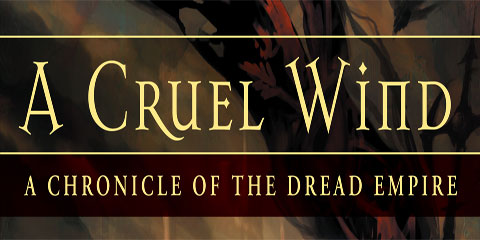
A Cruel Wind 2006 by Glen Cook
This edition of A Cruel Wind 2006 by Night Shade Books
Jacket art 2006 by Raymond Swanland
Jacket design by Claudia Noble
Interior layout and design by Jeremy Lassen
All rights reserved
"Introduction" 2006 by Jeff VanderMeer
A Shadow of All Night Falling 1979 by Glen Cook
October's Baby 1980 by Glen Cook
All Darkness Met 1980 by Glen Cook
First Edition
ISBN-10: 1-59780-055-4 Trade Hardcover
ISBN-10: 1-59780-054-6 Limited Hardcover
Night Shade Books
Please visit us on the web at
http://www.nightshadebooks.com
Electronic version by WebWrights
http://www.webwrights.com
GODFATHER OF MODERN HEROIC FANTASY
Glen Cook doesn't suffer fools easily. I mean this as a compliment, not a slam. It's an attitude that permeates his fiction as well: this sense of no-bullshit, no-compromise. Despite having written innumerable series, Cook still writes for himself first and foremost, and isn't willing to compromise his vision. As Cook himself has said, "I work in series because I can't tell a story in one book, usually. There's always more to tell. A series allows you to tell a larger story, usually. I enjoy world building."
Over the past twenty-five years, Cook has carved out a place for himself among the preeminent fantasy writers of his generation, with classics such as the Dread Empire novels, The Black Company novels, and the Starfishers series. His work is unrelentingly real, complex, and honest. The sense of place that permeates his narrative and characters gives his "fantasies" more gravitas and grit than most fictions set in the here-and-now. The people in his novels tend to be deeply flawedstruggling to do what's right but not always able to stick with it due to circumstances or simply human nature. As Cook says, "That's life. We all face it every day. And most of us don't live up to the talk we talk. How much more so when the stakes are life or death?"
If Cook is sometimes overlooked on the roll call of great fantasists, it may be because the genre is currently overshadowed by the over-emphasis on cross-genre work and new literary movements. But Cook has always created cross-genre fiction, if on his own terms. The Black Company novels, for example, combine the intensity of Viet Nam-era war fiction with the classic quest of heroic fantasy, while his Garrett detective series combines magic and noir mystery to excellent comic effect. He has also written the ultimate submarine novel in space, Passage at Arms. (Although long out of print, it is well worth seeking out. The claustrophobic evocation of what it might be like in close quarters on a spaceship remains one of Cook's great achievements.)
As the excellent fantasist Steven Erikson has written, "The thing about Glen Cook is that he single-handedly changed the field of fantasysomething a lot of people didn't notice and maybe still don't. He brought the story down to a human level, dispensing with the clichs and archetypes of princes, kings, and evil sorcerers. Reading his stuff was like reading Viet Nam war fiction on peyote."
But well before Cook's Black Company series, there was the Dread Empire trilogy, Cook's first major work.
I still remember the first time I read A Shadow of All Night Falling, the first in the Dread Empire trilogy. I had long since read the Tolkien books, the McKillip Riddlemaster series, and, earlier, the Narnia books. Then I'd tried reading Terry Brooks and David Eddings and a few others, and had been turned off of heroic and quest fantasy as a result.
Only a few months later, in Book Gallery, a used bookstore in Gainesville, Florida, something caught my eye in the mass market paperback SF/Fantasy section: the cover of A Shadow of All Night Falling. It didn't look like all the other heroic fantasy covers. I read the description on the back of the book:
Across the mountains called Dragon's Teeth, beyond the chill reach of the Werewind and the fires of the world's beginning, above the walls of the castle Fangdred it stands: Windtower. From this lonely keep the Star Rider calls forth the war that even wizards dread, fought for a woman's hundred-lifetime love. A woman called Nepanthe, princess to the Stormkings...
That didn't sound like the same-old same-old, either. So I read the prologue and it didn't read like anything I'd read before. There were suggestions of worlds within worlds and plots within plots. It was a true prologue, not one of those fake cliffhanger-type prologues. The prose was spare and tight and not given to melodrama. The idea of the Star Rider was presented in pragmatic and yet mysterious terms. (Ironically enough, the same day in the same bookstore I picked up Edward Whittemore's Jerusalem Poker, which would be another of my major influencesit too had a stylized cover and an amazing prologue.)
As I read the rest of the novel, I realized Cook was a true original, creating his own unique approachone that would increasingly be from the eye-level/foot-soldier level, one that could be blunt and bloody, but also include a very sophisticated view of societies and of people. The Western, Middle Eastern, and Far East influence worked well and made the story unique.
In short, I loved the book and quickly bought and read the other two initial volumes: October's Baby and All Darkness Met. I found myself drawn to characters like Nepanthe, Mocker, and so many others. These people came off the page in a fascinating way. Mocker in particularI loved that character, his complex motivation and his basic humanity.
There was also a talent Cook had for micro- and macro-level action and plain-spoken dialogue that made the stylization of much of heroic fantasy look flat and false. Not to mention that the series grew ever more complex as it progressed, with All Darkness Met demonstrating an amazing ability to juggle storylines, characters, and subtle intrigue.
What also struck me was just how weird and alien these books werethey didn't evoke the twee fussiness of Tolkien or the kind of fey detail of McKillip at all. Instead, they put me in mind of the best of the Weird Tales writers, and of icons like Jack Vance or Fritz Leiberanother unique writer who knew how to get at the strangeness of the world.
At the time, I was about eighteen or nineteen, just learning about the craft of writing, completely wet-behind-the-ears. From a writer's perspective, the Dread Empire trilogy was a goldmine. Like the Whittemore books I found at the same time, Cook's work explored both the complexity of history and the grim reality of its situations. Through the Dread Empire I learned how you could place characters in a historical context much larger than the individuals involved without relegating character to the background. Cook taught me that moral and immoral acts have consequences in fiction, some of them tragic. He also taught me a lot about how to inject specific detail into the fantastical. And more than anything else, Cook taught me that characters in a fantasy world have it just as tough as we do in real life. (Not to mention my excitement in reading the subsequent Dread Empire novelsThe Fire in His Hands, With Mercy Toward None, Reap the East Wind, and An Ill Fate Marshallingwhich share the attributes of the first three books while expanding on the characters and milieu. It's really hard not to be reduced to a fanboy writing about all of this, to be honest.)
Font size:
Interval:
Bookmark:
Similar books «A Cruel Wind: A Chronicle of the Dread Empire»
Look at similar books to A Cruel Wind: A Chronicle of the Dread Empire. We have selected literature similar in name and meaning in the hope of providing readers with more options to find new, interesting, not yet read works.
Discussion, reviews of the book A Cruel Wind: A Chronicle of the Dread Empire and just readers' own opinions. Leave your comments, write what you think about the work, its meaning or the main characters. Specify what exactly you liked and what you didn't like, and why you think so.

